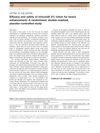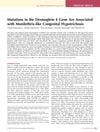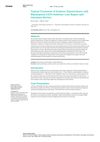 May 2020 in “Hair transplant forum international”
May 2020 in “Hair transplant forum international” Younger people and those with existing acne are more likely to get folliculitis after hair restoration surgery, but it doesn't affect the overall good hair growth result.
 November 2018 in “Hair transplant forum international”
November 2018 in “Hair transplant forum international” The article suggests that hair transplant surgery may not be purely cosmetic because it treats a disease and calls for clearer guidelines on its classification.
 36 citations,
October 2000 in “British Journal of Dermatology”
36 citations,
October 2000 in “British Journal of Dermatology” A different gene near the hairless gene on chromosome 8p21 causes a rare hair loss condition in a German family.
 9 citations,
February 2016 in “The Journal of Dermatology”
9 citations,
February 2016 in “The Journal of Dermatology” Minoxidil 3% lotion is effective and safe for increasing beard hair count.
 5 citations,
September 1986 in “Pediatric Dermatology”
5 citations,
September 1986 in “Pediatric Dermatology” A family showed a new condition with inherited hair loss and skin changes, possibly due to one genetic disorder.
 May 2015 in “Journal of Dermatological Science”
May 2015 in “Journal of Dermatological Science” Researchers found a new area on chromosome 2 linked to a genetic hair loss condition.
 74 citations,
January 2006 in “The journal of investigative dermatology/Journal of investigative dermatology”
74 citations,
January 2006 in “The journal of investigative dermatology/Journal of investigative dermatology” Mutations in the DSG4 gene can cause a rare hair disorder similar to monilethrix.
 7 citations,
May 2018 in “Curēus”
7 citations,
May 2018 in “Curēus” Bimatoprost 0.03% solution effectively promotes eyebrow growth.
 5 citations,
November 2006 in “Dermatologic Surgery”
5 citations,
November 2006 in “Dermatologic Surgery” Hair transplant surgery is a good cosmetic solution for people with little or no pubic hair, especially to boost their self-esteem.
 5 citations,
November 2006 in “Dermatologic Surgery”
5 citations,
November 2006 in “Dermatologic Surgery” Pubic hair transplant surgery is an effective and permanent treatment for pubic hair loss.
 4 citations,
November 2016 in “Dermatologic Therapy”
4 citations,
November 2016 in “Dermatologic Therapy” Topical tretinoin may increase beard hair density.
 55 citations,
November 2018 in “American journal of human genetics”
55 citations,
November 2018 in “American journal of human genetics” Mutations in the LSS gene cause a rare type of hereditary hair loss.
 12 citations,
June 1999 in “Dermatologic Surgery”
12 citations,
June 1999 in “Dermatologic Surgery” Hair restoration surgery can effectively increase pubic hair density, with patient satisfaction and natural results largely depending on the chosen hair pattern and graft design.
 14 citations,
April 2011 in “Journal of the American Academy of Dermatology”
14 citations,
April 2011 in “Journal of the American Academy of Dermatology” Researchers found a gene mutation responsible for a rare hair loss condition.
May 2023 in “Pharmaceuticals” Three specific mutations in the LIPH gene can cause hair loss by damaging the protein's structure and function.
13 citations,
August 2005 in “Journal of Investigative Dermatology Symposium Proceedings” Mutations in the DSG4 gene cause fragile, sparse hair in humans, mice, and rats.
 117 citations,
August 2019 in “Drug Design Development and Therapy”
117 citations,
August 2019 in “Drug Design Development and Therapy” Minoxidil effectively treats hair loss, but use cautiously and monitor side effects.
 38 citations,
March 2017 in “Expert Opinion on Investigational Drugs”
38 citations,
March 2017 in “Expert Opinion on Investigational Drugs” Bimatoprost is promising for treating some types of hair loss but needs more testing for androgenetic alopecia.
 33 citations,
March 2006 in “Seminars in cutaneous medicine and surgery”
33 citations,
March 2006 in “Seminars in cutaneous medicine and surgery” The document explains how to identify different hair problems using a microscope.
 2 citations,
January 2013 in “Elsevier eBooks”
2 citations,
January 2013 in “Elsevier eBooks” The document explains the genetic causes and characteristics of inherited hair disorders.
 89 citations,
September 2010 in “Annual Review of Genomics and Human Genetics”
89 citations,
September 2010 in “Annual Review of Genomics and Human Genetics” The document concludes that understanding the genes and pathways involved in hair growth is crucial for developing treatments for hair diseases.
 59 citations,
June 2008 in “Journal of The American Academy of Dermatology”
59 citations,
June 2008 in “Journal of The American Academy of Dermatology” The article explains the genetic causes and symptoms of various hair disorders and highlights the need for more research to find treatments.
 43 citations,
December 2013 in “Seminars in Cell & Developmental Biology”
43 citations,
December 2013 in “Seminars in Cell & Developmental Biology” Genetic mutations can cause hair growth disorders by affecting key genes and signaling pathways.
 18 citations,
August 2018 in “The FASEB journal”
18 citations,
August 2018 in “The FASEB journal” Rabbits lacking the Hoxc13 gene show similar hair and skin issues to humans with ECTD-9, making them good for research on this condition.
 11 citations,
September 2012 in “The journal of investigative dermatology/Journal of investigative dermatology”
11 citations,
September 2012 in “The journal of investigative dermatology/Journal of investigative dermatology” A mutation in the KRT71 gene causes a hair disorder by disrupting hair follicle structure and texture.

Researchers found a genetic link for hereditary hair loss but need more analysis to identify the exact gene.
 May 2014 in “JAMA Dermatology”
May 2014 in “JAMA Dermatology” Mother and son diagnosed with a rare genetic hair loss condition with no effective treatment.
 1 citations,
February 2013 in “InTech eBooks”
1 citations,
February 2013 in “InTech eBooks” Genetic mutations cause various hair diseases, and whole genome sequencing may reveal more about these conditions.

The research found that people's hair proteins vary, especially by ethnicity and body part, which could help identify individuals in forensic science.

The research found that people's hair proteins vary by individual and body part, with some differences between ethnic groups, which could help in forensics.



























